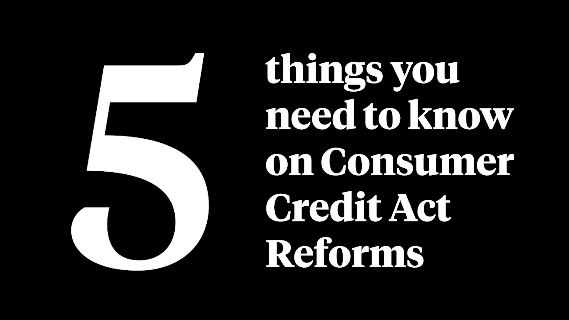Rachel Hillier & Sarah Drew, from our Financial Services Regulation team, break down the Consumer Credit Act reforms into 5 key things you need to know. Watch the video now to find out more.
Background to the Consumer Credit Act reform
The Consumer Credit Act reforms are part of the Government’s Edinburgh reforms, where they’ve been looking at driving growth in the financial services sector. These reforms were first published in 2022. The Consumer Credit Act has been around for a very long time, nearly 50 years, and the market has seen huge changes in that time. Even in the last ten years, the way people have been borrowing money has changed hugely, with far less face to face business going on. So, examples of this are car finance via online platforms, and buy now, pay later. And technology is playing a huge part in these changes. Read more about the background to the Consumer Credit Act in our dedicated article.
To make these changes easy to understand, we’ve broken them down into the top 5 things you need to know.
1. Why are the reforms needed and what are the problems?
There’s been lots of criticism of the Consumer Credit Act over the years. It’s difficult to navigate and notoriously inflexible, making it harder for businesses and for consumers to really understand their rights and obligations.
In particular, the form and content requirements – there’s a reliance on secondary legislation, that’s difficult to follow. If businesses get these requirements wrong, their agreements are unenforceable without a court order.
The Government themselves have described the current position as cumbersome and inflexible. Often the language is too formal, with things like statements of notices in arrears, which can often be heavy handed and daunting for customers when they receive them. That prescriptive language can cause distress unnecessarily.
The proportionality of sanctions is something else under review, with businesses seeking a discussion on whether the current regime offers appropriate sanctions or whether the current system is too demanding.
2. What is the Government proposing?
The Government has identified five principles for reform:
- Proportionate
Firstly, reforms should be proportionate. Levels and consumer protection should be appropriate, while balancing proportionate burdens on businesses. The Government has recognised that some customers in this market might be vulnerable and due care will be given to ensure that high levels of consumer protection are maintained. - Aligned
The reforms will be aligned with the implementation of the Smarter Regulatory Framework (SRF). The SRF, which is the delivery plan for the Edinburgh reforms. It will complement and support the Consumer Duty requirements and will ensure that consumer credit regulation broadly aligns with the style and substance of current financial services regulation, while recognising that due to the nature of consumer credit, it does have to be tailored to specific requirements in that area. - Forward-looking
Reforms will be forward-looking, being mindful that they need to be adaptable to future ways of delivering credit and consumer hire to consumers and the needs of consumers and businesses in the future. - Deliverable
The reforms will be designed to be deliverable by the financial services regulators and the industry. The Government is conscious that significant change may be required to internal processes and will ensure that adequate time is given for those changes to take effect. - Simplified
The goal of the reforms is to simplify and modify. They want to get rid of ambiguous technical terms used in the Consumer Credit Act and make it clear to consumers what protections they have and to make it easier for firms to communicate those.
3. What would businesses like to see?
One of the main things that businesses want to see is consolidation.
The current position is confusing with rules for regulated firms laid out in the Financial Conduct Authority’s (FCA) consumer handbook, CONC, and legislative requirements set out in the Consumer Credit Act.
Having both of these systems running parallel is a difficulty for businesses and for consumers to understand which bits apply to them and why. This streamlining process should be particularly helpful in relation to information requirements, which would make it much simpler and more accessible for businesses.
Sanctions
In relation to sanctions, one of the key aspects is unenforceability and whether enabling unenforceability for breaches of FCA rules is something that needs to be included in the new legislation. The FCA has indicated that it’s not sure whether this is workable or whether unenforceability should remain as part of the Consumer Credit Act.
There’s a big split of views on this, with the industry suggesting that it should be removed from legislation. But consumer groups and debt charities are more of the view that this is an important aspect of the current regime that needs to be retained. The Government largely seems to agree that this self-policing is a method of keeping businesses in line, especially in relation to formal content requirements.
It seems likely that this will be retained in some way, given there’s no equivalent in current FCA rules. I think it’s widely agreed that credit providers view the current regime as heavy handed, so proportionality of sanctions will be a big consideration.
4. What are the next steps for government plans to move forward with the overhaul of the Consumer Credit Act?
This is just the first stage. There’s going to be a number of years for these reforms to be completed. Further policy development will be needed to produce more detailed proposals and there will be a second stage consultation that’s expected in 2024.
5. When is the Consumer Credit Act reform going to happen?
There’s no specific timeline that’s been given for these reforms. There’s a possibility that we might see a staged approach. There’s also been an indication that information requirements that are given to the customer and sanctions might be first on the list. It might even be too difficult in practice, so we really will need to wait and see. But there’s definitely no certainty at this stage as to when we are going to see these reforms.
There is definitely a lot to take in with the Consumer Credit Act reforms. We advise on all aspects of credit and hire regulation, so can assist you and your business in navigating this complex area. Get in touch with our Financial Services Regulation experts.
✉️You can also stay updated with everything you need to know about the Consumer Credit Act reform, by signing up to our newsletter below. ✉️




